It’s common to look up health information online, but it might not always be the best course of action. This recent study looks into this trend, focusing on the ways people use the internet for health advice and how much they trust it compared to seeing a doctor. Tebra analyzed online search data from around the world and surveyed more than 1,000 Americans about the health information they seek online. This article conveys our findings about how people use online platforms in their search for health.
Key takeaways
- RSV (Respiratory Syncytial Virus) and pneumonia are the most frequently searched health concerns in the United States.
- Erectile dysfunction (ED) is the most searched health concern on TikTok.
- 86% of Americans have used online platforms for medical advice in the past year instead of consulting a doctor.
- 1 in 4 Gen Zers have used TikTok for medical advice in the past year instead of consulting a doctor.
- 1 in 8 Americans trust ChatGPT’s medical advice over a doctor’s.
Global health search analysis
In this age of instant information, online searches for health advice have become a global phenomenon. This section of our study takes a closer look at which countries show the highest engagement in seeking online health information and identifies the most searched health concerns worldwide.
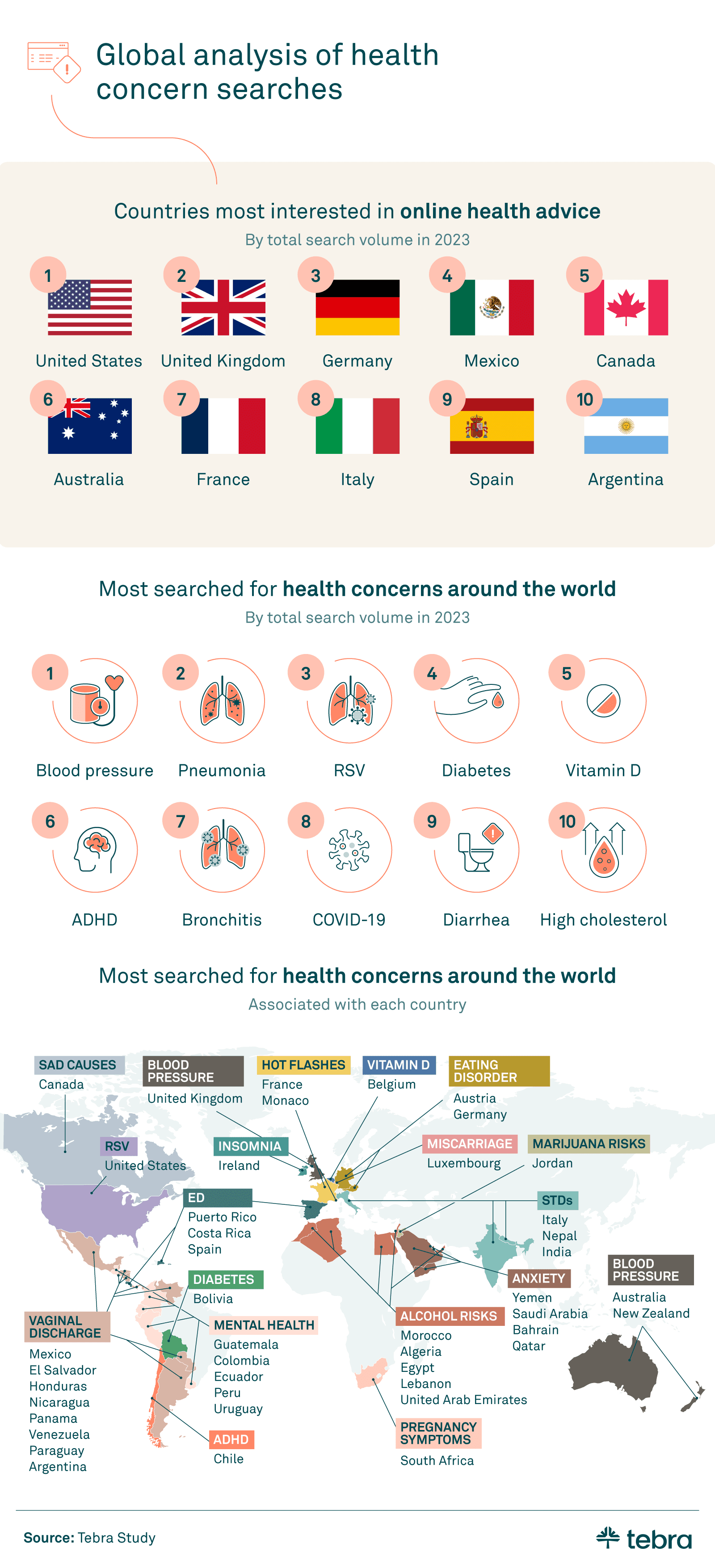
Our Google Trends search volume data analysis revealed that the United States has made the highest volume of searches for health-related terms in the past 12 months, followed by the United Kingdom, Germany, and Mexico. Canada, Australia, France, Italy, Spain, and Argentina also ranked among the top 10 countries searching for health answers, showing widespread interest in online health resources across continents.
Diving into the specifics, the most searched health concern globally was blood pressure. Other significant concerns included pneumonia, respiratory syncytial virus (RSV), and diabetes. Vitamin D, ADHD, bronchitis, COVID-19, diarrhea, and high cholesterol also featured prominently in the top 10 searches, highlighting the varied health challenges people seek to better understand through online sources.
Regional health search revelations
Zooming in from a global perspective to a regional one, we’ll now provide a detailed view of the health concerns dominating Google searches across different states and cities in the US.
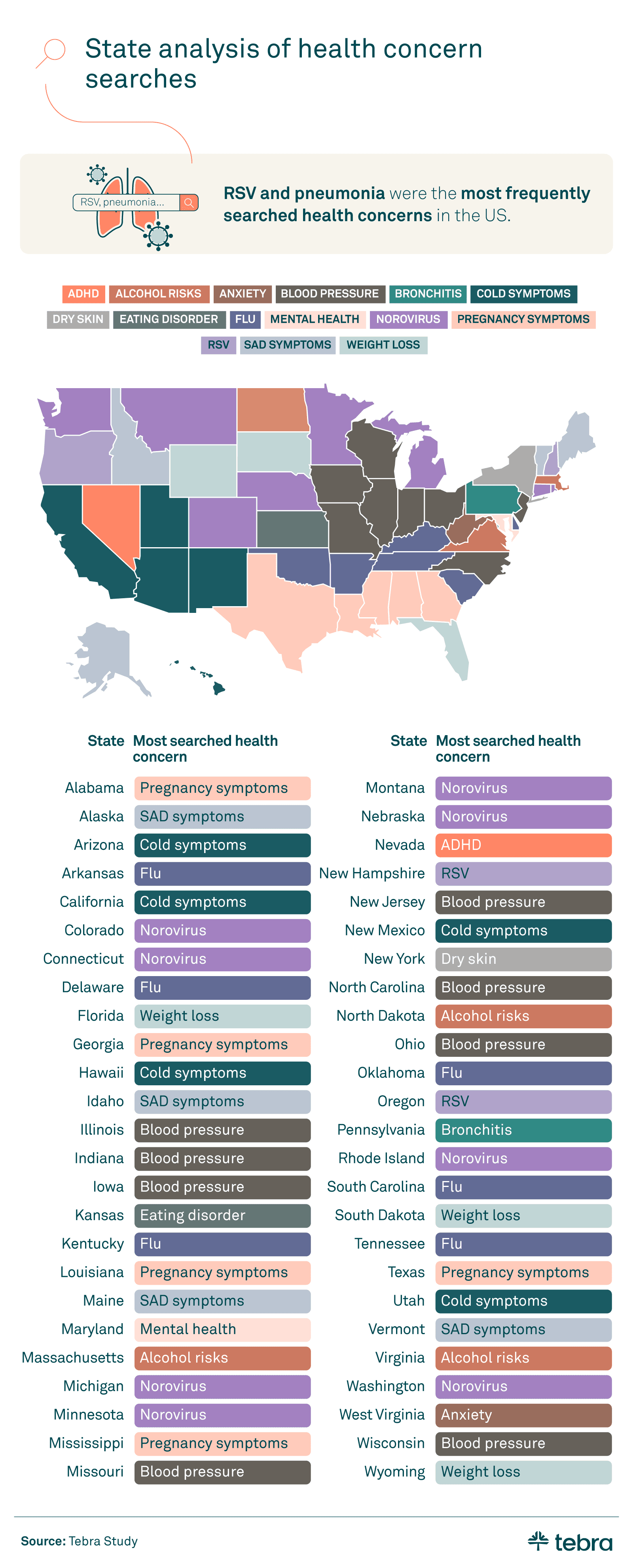
Respiratory health has been a top concern, as the nation grapples with a tripledemic of COVID-19, influenza (flu), and RSV this winter. In our state-by-state analysis, the most frequent health searches in the US centered around RSV and pneumonia. Other top concerns included the following:
- COVID-19
- Blood pressure
- Bronchitis
- Diabetes
- Erectile dysfunction (ED)
- Norovirus
- Diarrhea
- Vitamin D
- ADHD
Next, we examined the health term searches most associated with each of the 50 most populated cities in the US. Our city-level analysis showed COVID-19 topped the search list in Albuquerque, New Mexico, reflecting possible ongoing issues or worries about the pandemic there.
Top health Concerns for 2023-2024
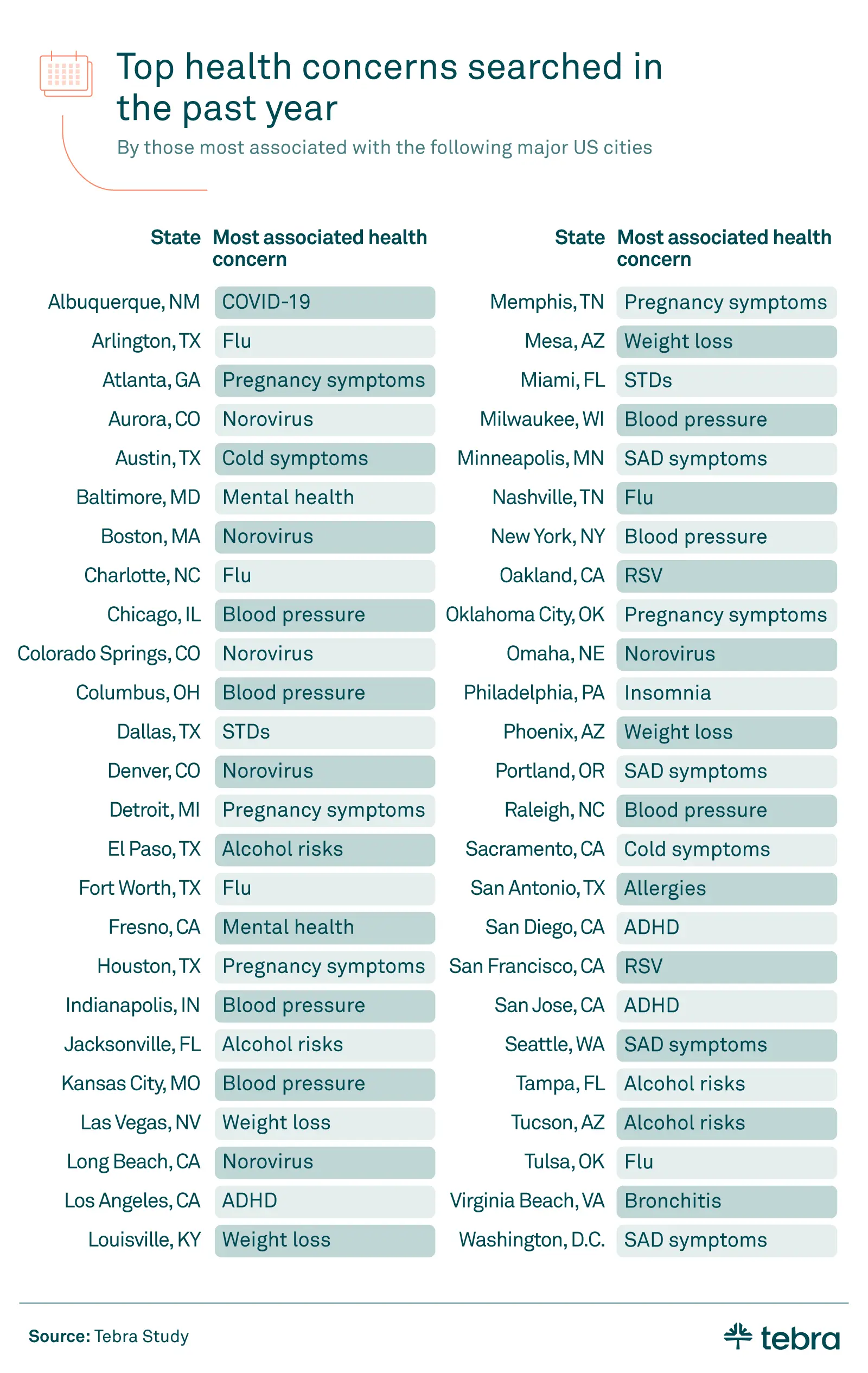
Residents in Arlington, Texas, and Charlotte, North Carolina, searched most for flu-related information compared to the national average search volume. Meanwhile, those in Atlanta, Detroit, Houston, and Oklahoma City were most interested in identifying pregnancy symptoms. Norovirus was a key concern in Boston and Denver, indicating a heightened curiosity about this gastrointestinal illness.
Searching for health on TikTok
Google isn’t the only place people are searching for health information online. This next section investigates the health topics most frequently searched on TikTok, examining the specific concerns that are capturing the attention of the platform’s user base.
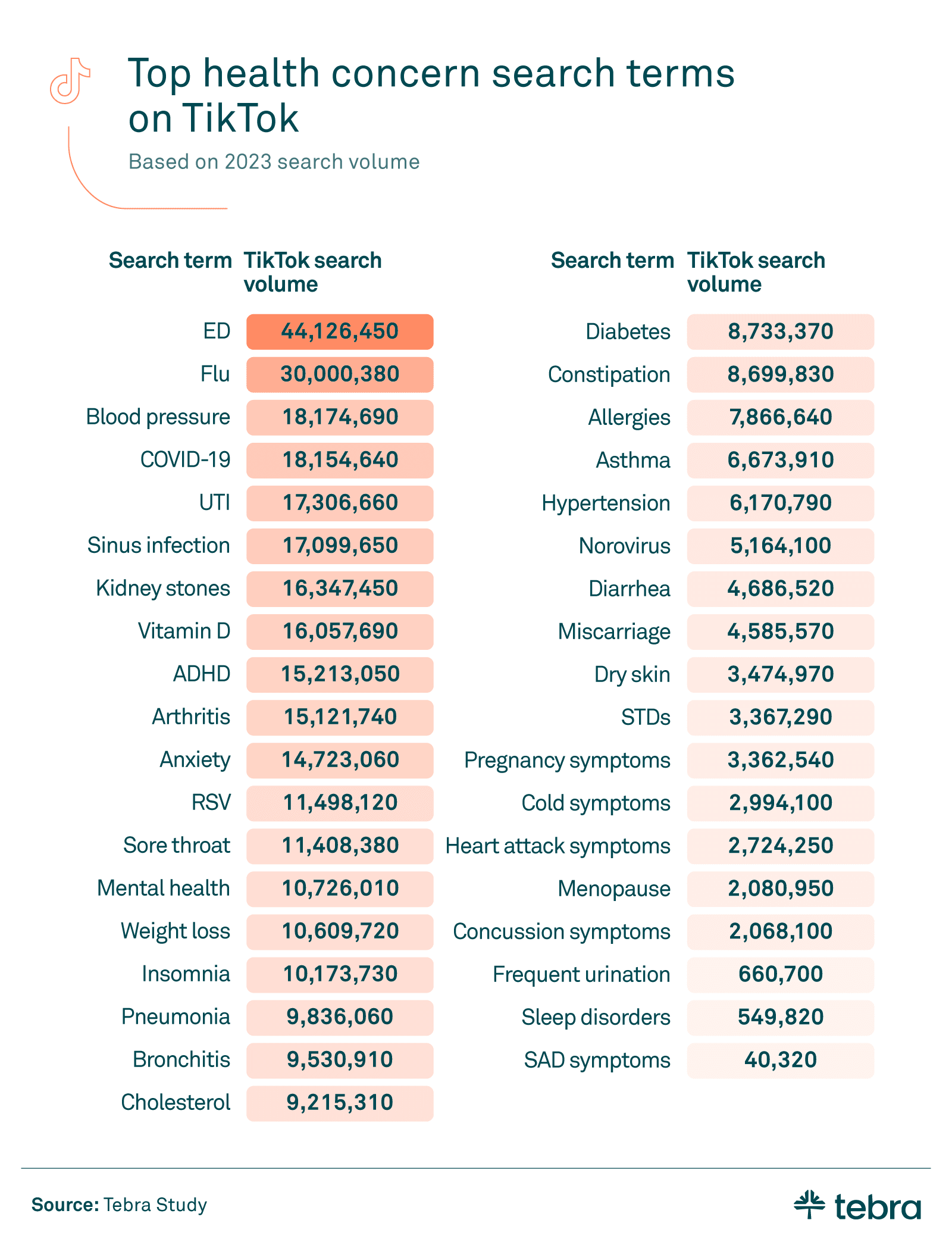
TikTok is becoming a hub for health-related inquiries. Our study revealed that ED topped the list of health concerns on TikTok, with a search volume of over 44 million. This indicates a strong interest among TikTok users in understanding and addressing this particular health issue.
The next most common health concern searches were for flu, blood pressure, COVID-19, and urinary tract infection (UTI). The search trends extended to a wide range of health issues, including these other highly common searches:
- Sinus infection
- Kidney stones
- Vitamin D
- ADHD
- Arthritis
These insights into TikTok’s health search trends offer a unique window into the diverse topics that resonate with the platform’s users. Our findings also stress the significance of social media in disseminating health information and highlight the need for accurate, engaging, and reliable health content tailored to the preferences of audiences on these platforms.
Cold weather health queries
As the weather shifts, so do the public’s health concerns. Let’s now explore how search behaviors for health issues evolve, particularly as we transition from the warmer months of summer to the colder winter season.
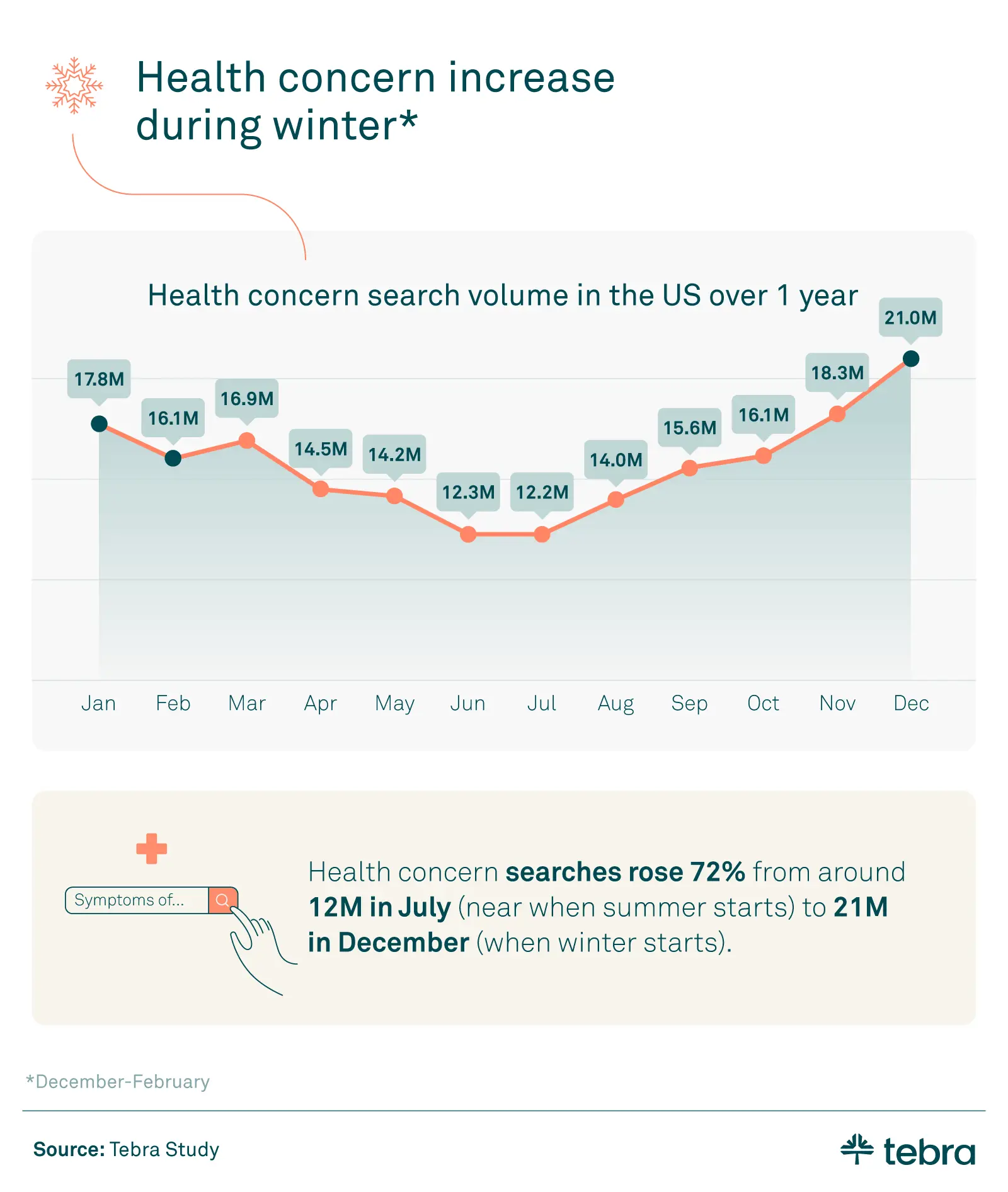
The impact of seasonal change on health is evident in the search patterns observed throughout the year. We noted an increase in health-related searches as winter approached, with our study showing a significant 72% surge in search volumes. The numbers escalated from approximately 12 million searches in July 2023 to 21 million by December 2023.
This considerable rise in search volume during the colder months could be attributed to the prevalence of seasonal ailments and the heightened awareness of winter health issues — especially as COVID-19 converges with flu and RSV this year. Conditions like flu, colds, and respiratory problems tend to peak during this time, leading more people to seek online health advice. Additionally, the winter months often bring challenges related to mental health, such as Seasonal Affective Disorder (SAD), prompting further health inquiries.
Digital platforms vs. doctor’s advice
Shifting our focus from analyzing search volume data, we’ll now review the findings from a survey of over 1,000 Americans, exploring their reliance on digital platforms for medical advice compared to traditional doctor consultations.
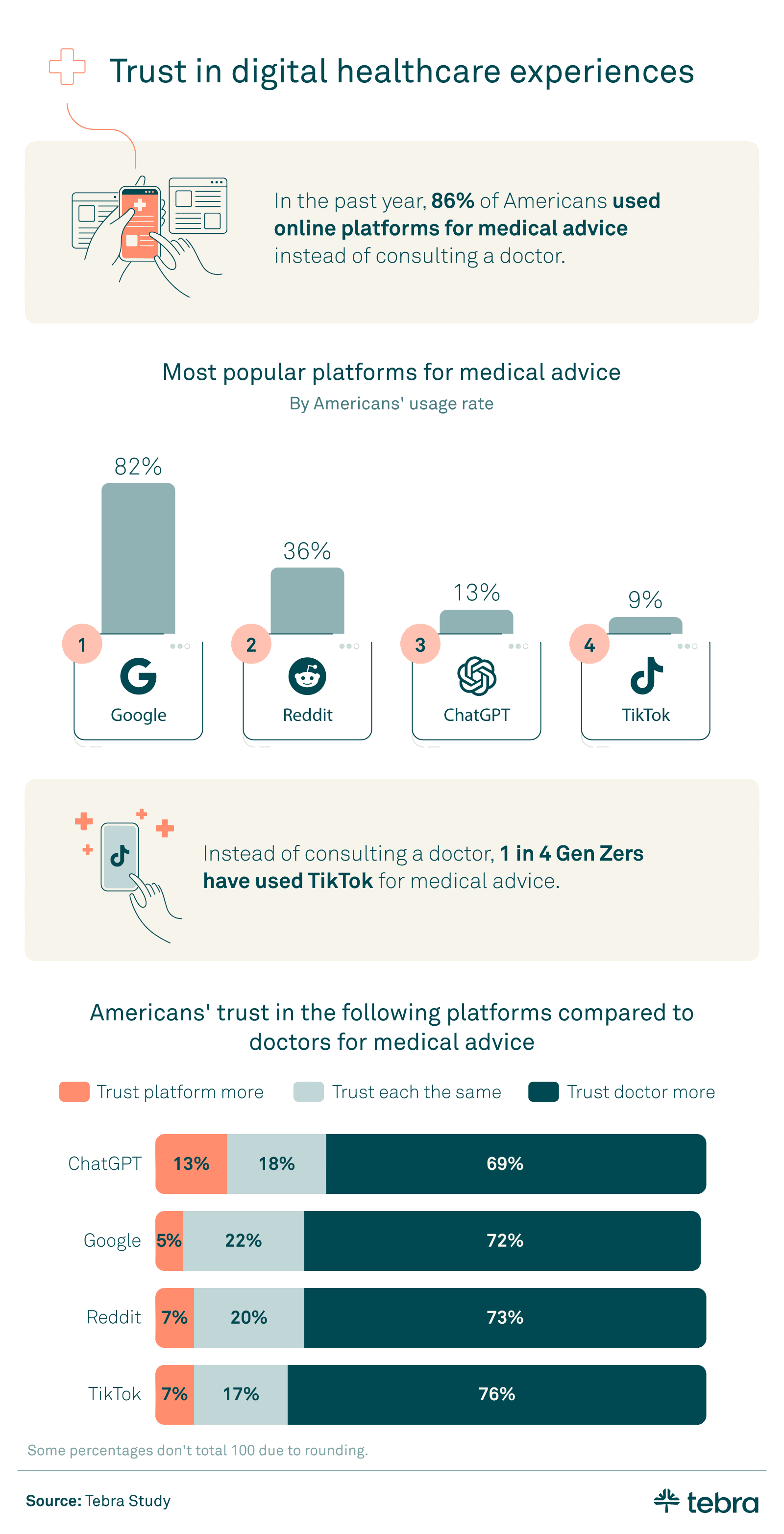
The advancement of digital technology has changed the way people seek medical advice. According to our survey, 86% of Americans have used online platforms for medical advice in the past year, bypassing consultations with healthcare professionals. While only 9% overall turned to TikTok, this trend was particularly high among the youngest generation — 25% of Gen Z. Furthermore, 1 in 8 Americans expressed more trust in ChatGPT for medical advice than in a doctor’s opinion.
The survey revealed that Reddit has become a key source of medical information as well, with 55% of Gen Z and 45% of Millennials using the site instead of consulting a doctor. Some Americans (1 in 5) have also used Google instead of going to their annual physical, especially Millennials (23%).
Despite the high usage of these platforms, only 8% of Americans reported trusting online advice more than a doctor’s, and just over a quarter (26%) indicated their trust in these platforms is about the same as in a doctor. Similarly, only 4% have acted on the advice they received online, highlighting a degree of caution in applying digital health suggestions.
Top reasons for consulting online medical resources
Our survey respondents also shed light on their reasons for turning to the internet for health-related advice. The primary motive for seeking medical advice online was nutrition and diet, with 61% of respondents prioritizing this area. Fitness and exercise routines came in second at 45%, indicating an interest in personal health and wellness maintenance through digital platforms.
General health and wellness concerns were also major reasons for online searches, as cited by 43% of respondents, while weight loss strategies and mental health garnered significant attention at 36% and 35%, respectively. Other key areas where people sought online guidance included:
- Gut health
- Cold vs. COVID-19 symptoms
- Seasonal allergies
- Cholesterol management
Although fundamental to health maintenance, preventive healthcare and regular check-ups were less frequently sought online, mentioned by only 14% of the participants. Gen Z’s use of online platforms for emotional support and shared experiences was particularly noteworthy, with 26% leaning toward digital sources over traditional medical consultations for these needs.
Balancing health and professional expertise
This study reveals a significant shift toward online health information, with a notable increase during colder months and varied preferences across generations. This emphasizes the need for accurate digital health literacy. Healthcare providers and public health officials might want to consider adapting to these changing behaviors, ensuring the public receives reliable advice from top sources. Balancing digital convenience with professional healthcare expertise is key to maintaining public well-being in this digital age.
Methodology
For this study, Tebra examined Google and TikTok search volume for terms related to health concerns in 44 different countries; each term was translated into the dominant language of each country. We also surveyed 1,002 Americans to explore their trust in online platforms over consulting a doctor’s perspective when seeking health advice. Among them, 13% were Gen Zers, 50% were Millennials, 27% were Gen Xers, and 10% were Baby Boomers.
About Tebra
In 2021, with a combined mission to unlock better healthcare, Kareo and PatientPop joined forces to form Tebra — a complete practice automation solution for independent healthcare providers. With an all-in-one, purpose-built platform to drive practice success and modernize every step of the patient journey, Tebra provides digital tools and support to attract new patients, deliver modern care, get paid quickly, and operate efficiently. To learn more about how Tebra is committed to improving patients’ and providers’ success and well-being, visit www.tebra.com.
Fair use statement
If you find the insights on digital health search behaviors and trust in online advice enlightening, feel free to share them for non-commercial use. We kindly request that you include a backlink to this page, ensuring others can explore our complete findings and research methodology.







